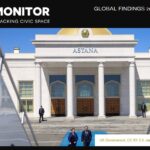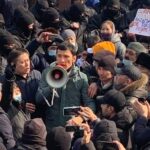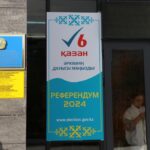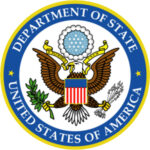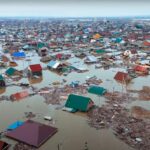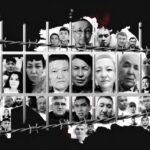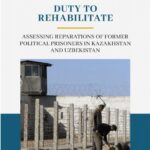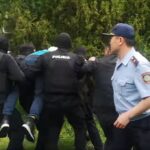A criminal investigation into the use of lethal force by security officials during the mass unrest in Zhanaozen in December 2011 resulted in charges being brought against five individual officers. Alleged organizers and participants were put on trial in March. Most of those charged with organizing and participating in the violence claimed that they were tortured to force their confessions. The leader of an unregistered opposition party received a long prison sentence for his alleged involvement in the Zhanaozen violence after an unfair trial. Independent media outlets were branded as “extremist” and closed down. Extraditions continued of individuals at risk of torture and other ill-treatment upon return to the countries requesting their return.
Excessive use of force
In January 2012, following an investigation into the lethal use of force by security forces, five senior security officers were charged with abuse of office in relation to the use of force in Zhanaozen. However, the number of deaths and serious injuries from gunshot wounds indicated that many more security officers had used firearms. The trial followed the events on 16 December 2011, where celebrations of the 20th anniversary of Kazakhstan’s independence in the south-western city of Zhanaozen were marred by violent clashes between protesters and police. At least 15 people were killed and more than 100 seriously injured. Reportedly, security forces had no specific training in using non-violent and proportionate methods of crowd control while policing protest demonstrations and strikes, despite months of being confronted by striking and protesting oil industry workers and their families and supporters in 2011.
In response to calls for further investigations into all cases of deaths and injuries, including those not recorded officially, in order to establish the true number of fatalities and casualties and bring all those responsible to justice, the General Prosecutor’s Office asserted in October that all available evidence had been thoroughly investigated by the Regional Department of Internal Affairs and that there was no need to bring further criminal charges against other security officers.
Five senior security officers from Mangistau Region and Zhanaozen city were charged in late January with abuse of office in relation to the use of firearms. According to the General Prosecutor’s Office, some of them had been identified using video footage. They were sentenced to between five and seven years in prison in May. Several police officers testifying at the trial as witnesses confirmed that they had used firearms to shoot directly at protesters. However, no charges were brought against them.
Torture and other ill-treatment
Most of the 37 defendants, put on trial in March in the regional capital Aktau for organizing or participating in the violence in Zhanaozen, alleged that they were tortured or otherwise ill-treated in detention by security forces in order to extract confessions, and recanted their confessions in court. The torture methods described by the defendants were consistent with the allegations made by many of the released detainees in December 2011, namely that they were taken to unofficial places of detention or underground detention facilities at police stations, stripped naked, made to lie or crouch on a cold concrete floor, doused with cold water, beaten and kicked by security officers, often to the point of losing consciousness. They would then be doused with cold water again and beaten at regular intervals in cycles lasting for hours. Ten of the witnesses for the prosecution withdrew their testimonies against the defendants during the trial proceedings and complained that they had been tortured or otherwise ill-treated into giving evidence implicating the defendants.
Some of the defendants identified police and security officers who had subjected them to torture and other ill-treatment. The police and security officers, accused by the defendants and their lawyers of opening fire at the demonstrators and ill-treating them in detention, testified in court as victims or witnesses, some of them anonymously. All police and security officers pleaded self-defence. When asked who had given the order to open fire, some of the officers stated that they had not received any orders to open fire but neither had they received any orders not to open fire. The General Prosecutor’s Office reviewed the allegations of torture at the request of the presiding judge but rejected the claims. Seven of the defendants were sentenced to up to seven years in prison.
Roza Tuletaeva, a labour activist who had been one of the main contact points for media and international organizations during the strike by oil industry workers in 2011, stated in court that during interrogations she was suspended by her hair, that security officers threatened to harm her 14-year-old daughter, that they put a plastic bag over her head to suffocate her and that they sexually humiliated and assaulted her. She said that she was too ashamed to describe the sexual torture she was subjected to in the courtroom as her family and friends were present. She was sentenced to seven years in prison for “inciting social discord”.
Unfair trials
In addition to the 37 individuals who were detained in Zhanaozen in December 2011 and stood trial in March 2012, security forces detained three political opposition activists based in Almaty in January, and a prominent theatre director and a youth activist in June, and charged them with “inciting social discord” and “destabilizing the situation in the region” in relation to the Zhanaozen events. All but two were released conditionally after several weeks in National Security Service (NSS) detention when they agreed to sign confessions, admitting that they had travelled to Zhanaozen to support the striking oil industry workers.
Prejudicial statements made in state-owned media outlets by high-ranking officials against all those charged in relation to Zhanaozen, as well as numerous procedural violations, such as restrictions on legal access and family visits, precluded them from receiving a fair trial. Lawyers acting for the activists in NSS detention were forced to sign non-disclosure statements, barring them from divulging any information relating to the criminal investigation into their clients’ cases.
On 23 January, NSS officers arrested Vladimir Kozlov, the leader of the unregistered opposition Alga party, at his Almaty home on charges of “inciting social discord”. They also searched his home, the Alga party office in Almaty, and the homes of several other party members. Vladimir Kozlov had gone to Zhanaozen in January as part of an independent public monitoring group to investigate the allegations of torture and other ill-treatment in police custody and then had briefed the European Parliament on his findings. He was detained in the NSS facilities in Aktau, with restricted access to his lawyers and family. On 8 October, he was convicted of “inciting social discord” and of attempting to overthrow the constitutional order by Aktau City Court, sentenced to seven-and-a-half years in prison and the court ordered the confiscation of his property. He was a prisoner of conscience. Independent monitors allowed into the trial reported that there was no presumption of innocence and that the evidence used against Vladimir Kozlov did not conclusively prove his guilt. In its verdict, the court also labelled several opposition media outlets that had covered the 2011 strikes and the investigations into the Zhanaozen violence, as “political extremists” that incited “social hatred”. On 19 November, the Appeals Court in Aktau upheld the verdict.
In March, prisoner of conscience Natalia Sokolova, the former legal representative for the striking Kazmunaigas workers in Zhanaozen, was unexpectedly released from prison after the General Prosecutor’s Office lodged a complaint against her sentence with the Supreme Court. She had been sentenced to six years in prison by Aktau City Court in August 2011 for “inciting social discord”.
Freedom of expression
New provisions in the security law which came into force in January penalized individuals and/or organizations for “influenc[ing] public and individual consciousness” through the distribution of “distorted” and “unreliable” information “to the detriment of national security”. There were fears that the authorities were intent on using national security legislation to curtail freedom of speech and of the media.
On 21 November, the Almaty city Prosecutor filed a complaint seeking to close down almost all remaining independent and opposition media – some of which had been named in Vladimir Kozlov’s verdict. He accused them of being “extremist”, inciting social discord and threatening national security. The complaint covered approximately 40 print, online and broadcast media outlets. It also called for the Alga party and the social movement Khalyk Maydany, both unregistered, to be classified as “extremist”. On the same day a court in Almaty ordered the immediate suspension of all Alga activities and other courts ordered the majority of the targeted media outlets to stop publication, distribution and broadcasting.
Refugees and asylum-seekers
In defiance of a decision of the UN Committee against Torture and in contravention of its obligations under international human rights and refugee law, Kazakhstan continued to detain individuals with a view to extraditing them to countries, such as Uzbekistan, where they would risk facing torture or other ill-treatment.
In June, the Committee decided that by extraditing 28 Uzbek men, including asylum-seekers to Uzbekistan, Kazakhstan was in violation of the UN Convention against Torture.
Sobir Nosirov, an Uzbekistani man, was held for 12 months for extradition purposes, and then released in July 2012 without charge. He had left Uzbekistan with his family to work in Russia in 2005 and was granted legal temporary residence and work permits. In July 2011 he was unexpectedly detained at the border with Kazakhstan, due to an arrest warrant issued by Uzbekistan for his alleged participation in the violent unrest in Andizhan in May 2005. He was held incommunicado for several days in Uralsk. Despite clear evidence that charges outlined in the extradition request did not stand up to scrutiny, the court did not release him from detention. He was released without an official explanation on 24 July 2012 and escorted by security forces to the Russian border.
SOURCE:
http://amnesty.org/en/region/kazakstan/report-2013



